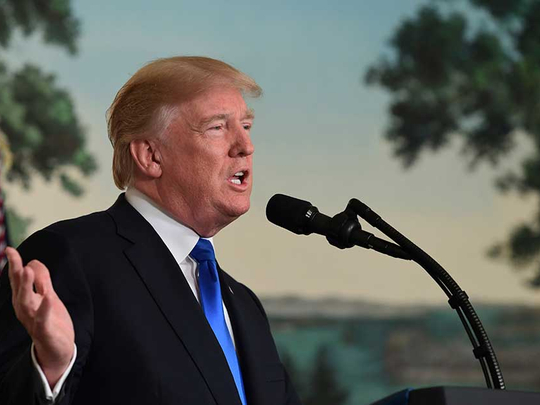
Washington: The strategy that President Donald Trump has laid out to confront Iran and renegotiate a 2015 nuclear agreement requires a string of big bets to pay off in short order. The risk of failure is enormous.
A hostile Congress must agree to pass legislation to toughen the terms of the accord. European allies with little appetite to upend the meticulously constructed agreement will have to change their minds. And Iran, no friend of the US for decades, needs to get on board.
The plan Trump announced on Friday, worked out over the course of months by State Department and National Security Council officials with the help of outside advisers, will need all of those pieces to fall into place in just the right order. If they don’t and Trump carries out his threat to back out of the deal, the US risks isolation from its allies and may lose critical leverage — verified international controls on Iran’s nuclear programme.
The biggest challenge will be getting allies on board, said Michael Singh, former senior director for Middle East affairs at the National Security Council under President George W. Bush and an advocate of toughening the deal. “The diplomacy will be difficult,” he said.
With his speech on Friday, Trump articulated an approach that’s been months in the making to reshape a deal he’d promised to shred. It’s in keeping with his belief that the nuclear agreement, worked out under his predecessor Barack Obama, was too narrow in its scope and only emboldened Iran to sponsor terrorist groups and pursue ballistic missiles.
The Trump administration argues that Iran, which says it has no intention of seeking a nuclear weapon, is in what the State Department calls “tactical compliance” with the accord but is only waiting for many of its terms to expire in the coming decades to develop a bomb.
Trump’s first stop will be Congress. In refusing to certify that Iran is complying with 2015 legislation reviewing the accord, he’s asking lawmakers to consider tough new sanctions on Iran. Those measures would go into effect automatically if Iran fails to meet more stringent restrictions on its ballistic missile development, sponsorship of terrorism and uranium enrichment.
With that legislation in hand, the administration is betting it will be able to present a solid front to European allies, playing off their own unease about some weaker elements of the deal to threaten new economic isolation of Iran.
That’s despite a joint statement on Friday by British Prime Minister Theresa May, German Chancellor Angela Merkel and French President Emmanuel Macron reaffirming their commitment to the accord, which they called “a major step towards ensuring that Iran’s nuclear programme is not diverted for military purposes.”
With the US, France, the UK and Germany all on one side of the table, the Trump team’s theory goes, Iran would feel sufficiently isolated and willing to make concessions it wasn’t prepared to stomach when the accord was negotiated. It’s a bet that US economic and military might are too great to be ignored.
But domestically, Congress could simply fail to pass the bill Trump wants, or conservatives in Congress could push to reimpose sanctions without waiting. Internationally, the European allies could join Iran, Russia and China in pressing ahead with the accord regardless of the US
In the worst case, there’s the threat of US military force to take out Iran’s nuclear programme — if that’s even possible. Or it may come down to economic warfare: European countries, along with China, Russia and other Iranian trading partners, would have to choose between doing business with Tehran or retaining access to the US financial system.
Iran’s response
If Iran backed out of the nuclear deal, it could blame Trump, and the US would be left with less insight than it had previously into the country’s nuclear activity.
“The Islamic Republic of Iran will not be the first to withdraw from the deal, but if its rights and interests in the deal are not respected, it will stop implementing all its commitments and will resume its peaceful nuclear programme without any restrictions,” Ghulam Ali Khoshroo, Iran’s ambassador to the United Nations, said on Friday in a letter to the Security Council.
It could also fracture relations with Germany, France and the UK.
“This creates a giant wedge — it’s Iran and the rest of the world on one side and the US on the other,” said John Glaser, director of foreign policy studies at the Cato Institute in Washington.
Trump’s strategy for Iran balances the president’s hostility to the nuclear accord against his advisers’ wariness of abandoning it. Trump’s senior-most national security officials, including Defence Secretary Jim Mattis and Secretary of State Rex Tillerson have advocated remaining in the agreement, as have even some hard-line conservatives in Congress.
Senate Foreign Relations Committee Chairman Bob Corker, a Tennessee Republican who plans to introduce the legislation critical to Trump’s plan, said he was optimistic about winning passage in Congress.
“We have provided a route to overcome deficiencies and to keep the administration in the deal, and actually make it the kind of deal that should have been in the first place,” Corker told reporters.
Corker is pressing the legislation despite an ongoing feud with the president. After Corker said the White House had become an “adult day care centre,” Trump lambasted him as “Liddle Bob Corker” and falsely claimed the senator backed the initial Iran deal.
Trump’s own advisers played down their prospects for success. Tillerson said the Congress plan isn’t a “slam dunk” and repeatedly raised the possibility that it might now work.
“We may be unsuccessful, we may not be able to fix it, and if we’re not, we may be out of the deal,” Tillerson told reporters. “I don’t want to suggest to you that we have a high chance of success.”












